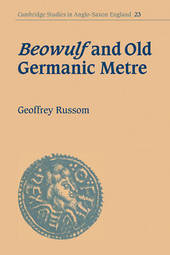
|
Beowulf and Old Germanic Metre
Paperback / softback
Main Details
Description
This 1998 book is a clear and accessible account of early Germanic alliterative verse which explains how such verse was treated by the Beowulf poet. There are differences of poetic style between Beowulf and the otherwise similar verse of ancient Scandinavia and continental Europe. Such distinctions have intrigued scholars for over a century, but Russom is the first to provide a systematic explanation of Old English, Old Norse, Old Saxon, and Old High German alliterative metres. The system of alliterative rules described by Russom derives from ordinary language; the rules change with language over historical time, rather than persisting as arbitrary restrictions. Once the relations between language and metre are identified, it is possible to see how language change yielded the divergent metrical practices which gave each tradition its special character. Russom's results should interest scholars of Old English and related Germanic languages, as well as linguists and those concerned with poetic metre.
Reviews"...the fact that Russom...has made such significant empirical predictios from the relevant generalization is a striking result of what is a remarkable, erudite, and necessary book." C.B. McCully, Journal of Record for Theoretical Linguistics "...on special topics. I am convinced that this inspiring new theory will...benefit." Dirk Huth, The Medieval Review "Russom's book is a splendid contribution to our understanding of early Germanic metrical systems and the linguistic rationale for them. That he leaves some questions unanswered, and that he raises a wide range of new ones, is not the least of its virtues." Speculum
|